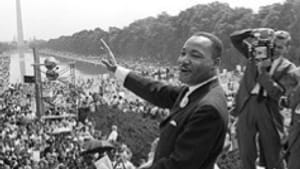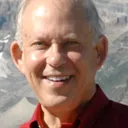Stay in the Loop
BSR publishes on a weekly schedule, with an email newsletter every Wednesday and Thursday morning. There’s no paywall, and subscribing is always free.
50 years since Dr. King's dream: What we gained, what we lost
Dr. King and the lost art of rhetoric

When I attended the March on Washington on August 28, 1963, I was a college-age radical. I remember that our bus stopped at a diner on the way back, and the blacks on board weren't allowed access to the place until someone made a fuss. And that was on the Maryland/Delaware border. Racial segregation was still an ever-present reality then.
But what I remember most was the sheer eloquence of Martin Luther King's "I Have a Dream" speech. I now know that the speech's last section— the most memorable part— was uttered spontaneously at the urgings of Mahalia Jackson, who was standing behind him in more ways than one.
This year, I didn't go to Washington, either to the march or President Obama's speech celebrating the event's 50th anniversary. To me, it's a different world, and I wanted to reflect— alone, away from the crowd.
Forked tongues
I know that Dr. King and those events altered the course of American history for so much the better, and started us on the road to ending the blight of segregation and the persecution of African Americans. Yet what I felt last week was loss— not of losing any battle, but of the passing of an era of meaningful and empowering discourse.
Among his other notable qualities, Martin Luther King was the last great American orator and rhetorician. The quality of speech and culture in our country has lost so much since that time.
Politicians and other Machiavellian types have always spoken with forked tongues, empty minds and passionless souls. But today everybody speaks and writes that way. There is no eloquence or trustworthiness in our communication any more.
Believable politicians
The lack of passion and commitment in our words reflects changes in our culture, technology and moral fiber that have occurred since the time when you could believe the words of a King, or a JFK, or, going back further, an Edward R. Murrow, an Eisenhower an Adlai Stevenson or a Roosevelt. (Ike and Adlai weren't great rhetoricians, but you could trust them. After Nixon, you couldn't trust anyone.)
Today, there is no room for eloquent, meaningful speech. We are inundated with advertising, e-mail messages, tweets, and Facebook pages. All this creates a din that masks our diminishing ability to talk honestly, simply and clearly to one another as neighbors whose face-to-face presence tells us that we are embodied, concerned human beings.
Now we upload YouTube files of an animal in our front yard, and we "text" and "tweet" billions of trivial messages each day in such an unthinking manner that we might crash a car or go unintentionally "viral," our messages absorbed by the masses. Today, every utterance, "message" and image becomes corrupted. There's nothing substantial or existentially meaningful about our communication processes.
Neighbors with Smartphones
This corruption of communication, however, is a mere symptom of the disempowerment of authentic communities in our society. Such communities are a middle-class "average American" phenomenon, where people share common struggles and concerns. The upper class and the intelligentsia (today we call them "yuppies" and "geeks") no longer live in physical communities; they live in possessions and accumulations, like monarchs of old.
Our erstwhile "neighbors," meanwhile walk and talk on Smartphones and browse on tablets. They live in the space between their heads and their devices, rarely taking the time to look at the person next to them.
When was the last time you and your neighbor sat on a stoop and talked one-on-one, in person, heart to heart? Doing that could be dangerous. You could get hit by a stray bullet or dissed by your friends who consider it more "social" to watch a football game together on TV.
Solving school crises
This diminution of sustained immediate connection produces real consequences. It erodes our power to make substantive changes and follow them through to genuinely positive outcomes, because we can't stick together long enough to see things through to a conclusion.
Consider America's current public school dilemmas. The problems are not just about money, although that's surely important. Solving them requires continuing dialogue, mutual trust and lasting commitment to the human condition.
But we don't engage with one another in that way any more. Well, maybe some individuals do, but it's not the everyday fare of our society.
Community of preachers
So when I think back to Dr. King, I remember with longing and nostalgia the eloquence of his speech, and that he could so profoundly affect the hearts and minds of millions of Americans with his extraordinary words that captured the historical moment. And the common people felt sufficiently empowered that they could come together to do something about it.
I can't imagine a Dr. King tweeting to his fans, or doing a five-minute YouTube video or a sound bite interview on the "Today Show." King came from a family and community of preachers who spoke at great length to their congregations and cared for the fate of their souls. They didn't "double-click" on "Great God Almighty, Free at Last!" They got it from the patience and suffering it took for their forebears to travel to freedom on the Underground Railroad.
But what I remember most was the sheer eloquence of Martin Luther King's "I Have a Dream" speech. I now know that the speech's last section— the most memorable part— was uttered spontaneously at the urgings of Mahalia Jackson, who was standing behind him in more ways than one.
This year, I didn't go to Washington, either to the march or President Obama's speech celebrating the event's 50th anniversary. To me, it's a different world, and I wanted to reflect— alone, away from the crowd.
Forked tongues
I know that Dr. King and those events altered the course of American history for so much the better, and started us on the road to ending the blight of segregation and the persecution of African Americans. Yet what I felt last week was loss— not of losing any battle, but of the passing of an era of meaningful and empowering discourse.
Among his other notable qualities, Martin Luther King was the last great American orator and rhetorician. The quality of speech and culture in our country has lost so much since that time.
Politicians and other Machiavellian types have always spoken with forked tongues, empty minds and passionless souls. But today everybody speaks and writes that way. There is no eloquence or trustworthiness in our communication any more.
Believable politicians
The lack of passion and commitment in our words reflects changes in our culture, technology and moral fiber that have occurred since the time when you could believe the words of a King, or a JFK, or, going back further, an Edward R. Murrow, an Eisenhower an Adlai Stevenson or a Roosevelt. (Ike and Adlai weren't great rhetoricians, but you could trust them. After Nixon, you couldn't trust anyone.)
Today, there is no room for eloquent, meaningful speech. We are inundated with advertising, e-mail messages, tweets, and Facebook pages. All this creates a din that masks our diminishing ability to talk honestly, simply and clearly to one another as neighbors whose face-to-face presence tells us that we are embodied, concerned human beings.
Now we upload YouTube files of an animal in our front yard, and we "text" and "tweet" billions of trivial messages each day in such an unthinking manner that we might crash a car or go unintentionally "viral," our messages absorbed by the masses. Today, every utterance, "message" and image becomes corrupted. There's nothing substantial or existentially meaningful about our communication processes.
Neighbors with Smartphones
This corruption of communication, however, is a mere symptom of the disempowerment of authentic communities in our society. Such communities are a middle-class "average American" phenomenon, where people share common struggles and concerns. The upper class and the intelligentsia (today we call them "yuppies" and "geeks") no longer live in physical communities; they live in possessions and accumulations, like monarchs of old.
Our erstwhile "neighbors," meanwhile walk and talk on Smartphones and browse on tablets. They live in the space between their heads and their devices, rarely taking the time to look at the person next to them.
When was the last time you and your neighbor sat on a stoop and talked one-on-one, in person, heart to heart? Doing that could be dangerous. You could get hit by a stray bullet or dissed by your friends who consider it more "social" to watch a football game together on TV.
Solving school crises
This diminution of sustained immediate connection produces real consequences. It erodes our power to make substantive changes and follow them through to genuinely positive outcomes, because we can't stick together long enough to see things through to a conclusion.
Consider America's current public school dilemmas. The problems are not just about money, although that's surely important. Solving them requires continuing dialogue, mutual trust and lasting commitment to the human condition.
But we don't engage with one another in that way any more. Well, maybe some individuals do, but it's not the everyday fare of our society.
Community of preachers
So when I think back to Dr. King, I remember with longing and nostalgia the eloquence of his speech, and that he could so profoundly affect the hearts and minds of millions of Americans with his extraordinary words that captured the historical moment. And the common people felt sufficiently empowered that they could come together to do something about it.
I can't imagine a Dr. King tweeting to his fans, or doing a five-minute YouTube video or a sound bite interview on the "Today Show." King came from a family and community of preachers who spoke at great length to their congregations and cared for the fate of their souls. They didn't "double-click" on "Great God Almighty, Free at Last!" They got it from the patience and suffering it took for their forebears to travel to freedom on the Underground Railroad.
Sign up for our newsletter
All of the week's new articles, all in one place. Sign up for the free weekly BSR newsletters, and don't miss a conversation.

 Victor L. Schermer
Victor L. Schermer